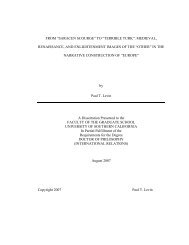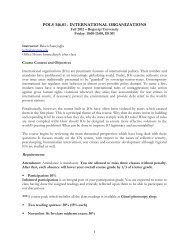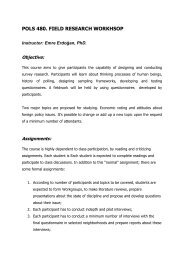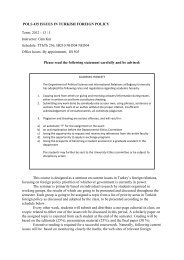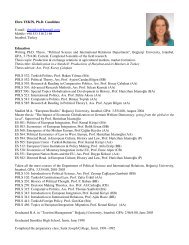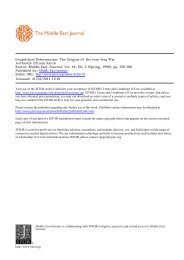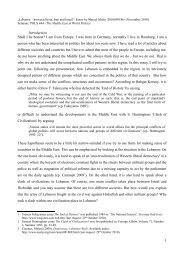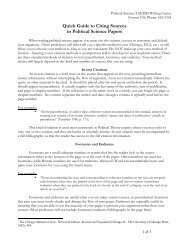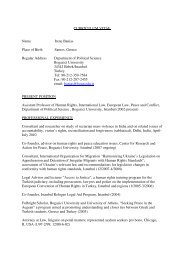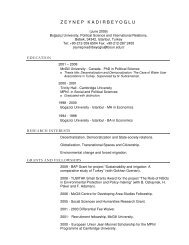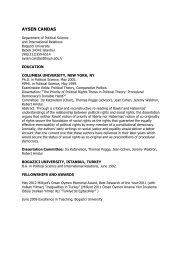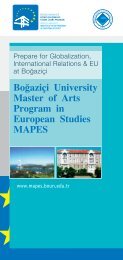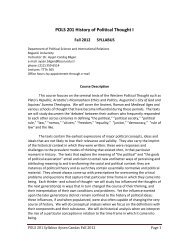POLS 206 Political Science Research Methods Zeynep ...
POLS 206 Political Science Research Methods Zeynep ...
POLS 206 Political Science Research Methods Zeynep ...
Create successful ePaper yourself
Turn your PDF publications into a flip-book with our unique Google optimized e-Paper software.
<strong>Zeynep</strong> Kadirbeyoglu<br />
Office: IB 502<br />
Office Hours: Fridays 13.00-14.00<br />
<strong>POLS</strong> <strong>206</strong><br />
<strong>Political</strong> <strong>Science</strong> <strong>Research</strong> <strong>Methods</strong><br />
Course Description and Objectives<br />
This course is designed to give you an overview of different empirical research methods in<br />
political science. The goal is to equip you with the tools of conducting your own research and<br />
enable you to become a critical reader of diverse types of political science research papers,<br />
articles and books. Course reading pack is available from Gunel Fotokopi.<br />
Plagiarism and Academic Honesty: Plagiarism is a serious problem and refers to dishonestly<br />
representing someone else’s ideas as your own. Plagiarism is punished by disciplinary<br />
committee and usually results in an F as course grade and sometimes heavier penalties. All<br />
students must understand the meaning and consequences of cheating, plagiarism and other<br />
academic offences<br />
(http://www.buowl.boun.edu.tr/students/favoidingplagiarism.htm ).<br />
The Department of <strong>Political</strong> <strong>Science</strong> and International Relations has the following rules and<br />
regulations regarding academic honesty.<br />
1. Copying work from others or giving and receiving answers/information during exams<br />
either in written or oral form constitutes cheating.<br />
2. Submitting take-home exams and papers of others as your own, using sentences or<br />
paragraphs from another author without the proper acknowledgement of the original<br />
author, insufficient acknowledgement of the consulted works in the bibliography, all<br />
constitute plagiarism. For further guidelines, you can consult:<br />
http://library.citytech.cuny.edu/instruction/plagiarism/index.php<br />
3. Plagiarism and cheating are serious offenses and will result in:<br />
● an automatic F in the assignment or the exam,<br />
● an oral explanation before the Departmental Ethics Committee,<br />
● losing the opportunity to request and receive any references from the entire<br />
faculty,<br />
● losing the opportunity to apply in exchange programs,<br />
● losing the prospects of becoming a student assistant or a graduate assistant in<br />
the department.<br />
The students may further be sent to the University Ethics committee or be subject to disciplinary<br />
action.
Evaluation<br />
Midterm Exam 25% - you are responsible from both class notes and readings. May 18.<br />
Location: NH104-105.<br />
<strong>Research</strong> Project - you should choose the qualitative or the quantitative track.<br />
I) Formulation of a research question (2.5%) DUE MARCH 16<br />
Write down in a paragraph the research question which you would like to write your research<br />
paper on.<br />
II) Finding appropriate sources from the literature (2.5%) DUE MARCH 30<br />
You should improve your research question based on my suggestions and in the meantime<br />
conduct a thorough research in the library and web based databases for articles and books<br />
relevant to your research question. You should compile a list for the bibliography for your<br />
research paper. At this point it is not necessary that you read all the articles and books in this<br />
list but you should at least have skimmed through in order to know whether they will be relevant<br />
to your research.<br />
III) Writing the literature review and making your research question more specific (10%)<br />
DUE APRIL 13<br />
Provide a brief literature review that justifies your study and sets the theoretical framework for<br />
your research paper. Do not forget to include the bibliography at the end.<br />
Qualitative track:<br />
IV) <strong>Research</strong> (20%) DUE MAY 4<br />
Formulate your hypotheses<br />
Conduct interviews<br />
Transcribe<br />
Write field notes<br />
V) Analysis (30%) DUE MAY 25<br />
Analysis of data:<br />
Write an appendix about how you analyzed<br />
your data.<br />
Write your findings and your conclusion and<br />
put together the research report.<br />
Quantitative track:<br />
IV) <strong>Research</strong> (20%) DUE MAY 4<br />
Formulate your hypotheses<br />
Discuss conceptualization and<br />
measurement<br />
Find an appropriate database<br />
V) Analysis (30%) DUE MAY 25<br />
Analysis of data using SPSS<br />
Tables and charts<br />
Write and appendix about the process of<br />
data analysis<br />
Interpretation of results and conclusion; put<br />
together the research report<br />
VI) Presentation (10%) DUE MAY 20
Late papers/reviews/assignments: there will be 3 percent penalty per day for late papers and<br />
reviews.<br />
Course Schedule<br />
Introduction and course overview<br />
Why do we study research methods? Why is it necessary?<br />
What should we know after the course is over?<br />
Philosophy of social sciences<br />
What is science? Scientific method. Paradigms. Social science research? What is distinctive<br />
about it? What is scientific about political science?<br />
● Gabriel A. Almond; Stephen J. Genco. "Clouds, Clocks, and the Study of Politics" World<br />
Politics, Vol. 29, No. 4. (Jul., 1977), pp. 489-522<br />
● Rogers M. Smith 1997. Still Blowing in the Wind: The American Quest for a Democratic,<br />
Scientific <strong>Political</strong> <strong>Science</strong>. Daedalus, Vol. 126, No. 1, pp. 253-287.<br />
● Hirschman, A. O., 1970 (April). “The Search for Paradigms as a Hindrance to<br />
Understanding,” World Politics, 22 (3): 329<br />
● Hall, PA. 2003. Aligning Ontology and Methodology in Comparative <strong>Research</strong>.<br />
Comparative Historical Analysis in the Social <strong>Science</strong>s. (James Mahoney, Dietrich<br />
Rueschemeyer, Eds.).:Ch.11., Cambridge, UK and New York: Cambridge University<br />
Press.<br />
Positivist versus Interpretivist Traditions<br />
● Lin, A. C. 1998. “Bridging Positivist and Interpretive Approaches to Qualitative <strong>Methods</strong>”<br />
Policy Studies Journal. 26(1): 162-180.<br />
● Wedeen, L. Ethnography as Interpretive Enterprise in Edward Schatz, ed., <strong>Political</strong><br />
Ethnography: What Immersion Contributes to the Study of Power (Chicago, 2009)<br />
● Steflja, I. Positivist and Interpretivist Traditions.<br />
<strong>Research</strong> process in political science:<br />
<strong>Research</strong> questions, theories, concepts and hypotheses<br />
<strong>Research</strong> Design<br />
Large N studies, case studies etc.<br />
How to formulate research questions? What are theories, concepts and hypotheses?<br />
Conceptualization, operationalization, measurement.<br />
Index and scale.<br />
Validity and reliability.<br />
Ethics<br />
Writing in social sciences
● Manheim et al. 2008. Chapter 2. Theory Building: Concepts, and hypotheses in political<br />
research<br />
● Nachmias and Nachmias Chapter 3 Basic Elements of <strong>Research</strong><br />
● Munck and Verkuilen. 2002. Conceptualizing and Measuring Democracy: Evaluating<br />
Alternatibe Indices. Comparative Poitical Studies. Vol 35. No.1.<br />
● Nachmias and Nachmias Chapter 4 - Ethics in Social <strong>Science</strong> <strong>Research</strong>.<br />
● Becker, H.S. 1986. Writing for social scientists. The University of Chicago Press.<br />
Proposal writing<br />
● Sample proposal in the reading pack.<br />
● Miriam Golden. 2001. “Why Do Trade Unions Call Strikes That Seem Sure to Fail?” in<br />
<strong>Political</strong> <strong>Science</strong> as Puzzle Solving, ed. Bernard Grofman. Ann Arbor: University of<br />
Michigan Press.<br />
Conducting Literature Reviews and the Issue of Plagiarism<br />
● Bottholph and johnson Chapter 5 - Conducting a Literature Review.<br />
● Avoiding and Detecting Plagiarism - The City University of New York.<br />
Fieldwork<br />
● Wood, E.J. 2009. “Field <strong>Research</strong>” in Boix and Stokes eds. Oxford Handbook of<br />
Comparative Politics.<br />
Sampling<br />
● Nachmias and Nachmias Chpater 8 - Sampling and Sample Designs.<br />
Experimental Method<br />
● Hyde, S.D. 2007. The Observer Effect in International Politics: Evidence from a Natural<br />
Experiment. World Politics. 60.<br />
Collecting data through surveys and scaling thechniques<br />
● Mannheim Chapters on survey research and scaling techniques. pp. 137-179.<br />
Collecting data through qualitative methods: interviews, participant observation, focus<br />
groups, political ethnography<br />
● Leech, Beth L. ed. Symposium on “Interview <strong>Methods</strong> in <strong>Political</strong> <strong>Science</strong>” PS: <strong>Political</strong><br />
<strong>Science</strong> and Politics 23:3 (December 2002), 663-688.<br />
● Michael Burawoy. Appendix. Teaching participant observation in Burawoy ed.<br />
Ethnography unbound : power and resistance in the modern metropolis.<br />
● Schatz, E. 2009. Ethnographic Immersion and the Study of Politics. in Edward Schatz,<br />
ed., <strong>Political</strong> Ethnography: What Immersion Contributes to the Study of Power (Chicago,<br />
2009)<br />
● Bratton, Michael and Liatto-Katundu, Beatrice. “A Focus Group Assessment of <strong>Political</strong><br />
Attitudes in Zambia.” African Affairs 93: 373 (October 1994), 535-63.
● Williams, Christine L. and Heikes, E. Joel. “The Importance of <strong>Research</strong>er’s Gender in<br />
the In-Depth Interview: Evidence from Two Case Studies of Male Nurses.” Gender<br />
&Society 7:2 (June 1993), 280-91.<br />
Archival research<br />
● Berg, B.L. Qualitative <strong>Research</strong> <strong>Methods</strong>, p. 271-287 (Archival Strategies)<br />
<strong>Research</strong> in the field of International Relations and Histroical Analysis<br />
● Marc Trachtenberg. The Craft of International History: A Guide to Method, Princeton:<br />
Princeton University Press, 2006. pp. 169-182.<br />
Analysis of qualitative data<br />
● Berg, B.L. Qualitative <strong>Research</strong> <strong>Methods</strong>, p. 146-153 (Analyzing data obtained from<br />
interviews)<br />
● Haydar Darici. 2011. Politics of privacy: forced migration and the spatial struggle of the<br />
Kurdish youth. Journal of Balkan and Near Eastern Studies. Vol 13. No 4.<br />
Analysis of quantitative data<br />
Optional readings are available from Gunel Fotokopi<br />
Examples which will be discussed in class<br />
● Putnam, Robert D. et al. 1983. "Explaining Institutional Success: The Case of Italian<br />
Regional Government." American <strong>Political</strong> <strong>Science</strong> Review 77 (1):55-74.<br />
● Jackman, Robert W. 1973. "On the Relation of Economic Development to Democratic<br />
Performance." American Journal of <strong>Political</strong> <strong>Science</strong> 17 (3):611-21.<br />
● Tavits, M. 2007. Clarity of Responsibility and Corruption. American Journal of <strong>Political</strong><br />
<strong>Science</strong>. Vol 51 No.1.<br />
Content analysis<br />
● Berg, B.L. Qualitative <strong>Research</strong> <strong>Methods</strong>, p. 338-377 (An Introduction to Content<br />
Analysis)<br />
Disseminating your findings and conclusion<br />
● Mannheim. Chapter 22 - Writing (and reading) the research report.<br />
● Mannheim Chapter 23 - overview of research process.



